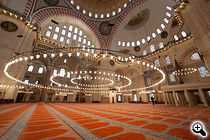Under the elegant, soaring arches of Istanbul’s newly restored, 16th century Süleymaniye Mosque, dozens of security cameras keep an eye on visitors’ every move. Vigilant security guards patrol indoors and out. Turkey, police say, is becoming the epicenter of an international market for stolen Islamic art, and Turkish mosques and museums alike are on high alert.

That means the responsibilities of the imam at Süleymaniye Mosque, widely considered the city’s most magnificent, now include not only looking after the people’s faith, but, increasingly, the valuable contents of the mosque itself.
“We are more comfortable with the presence of the security guards. We feel this place is secure,” said Imam Ayhan Mansiz. “Thank God, we didn’t experience any theft. Our mosque is safe. The restoration has just been completed and everything is listed and categorized, and the most valuable items are now in museums.”
The tight security provisions are all part of the Turkish state’s battle against the growing scourge of thefts of Islamic art from Turkish mosques and museums. Be it historic Korans, intricate wall tiles or even wooden paneling, all items are potential candidates for theft, an unwelcome by-product of an international boom in demand for Islamic art. There are no official figures for losses, but anecdotal evidence suggests they are significant.
“The overall turnover in the market has risen hugely,” commented William Robinson, director of the Islamic Art and Carpet Departments at the London-based auction house, Christie’s. Robinson traces the heightened interest in Islamic art back to 1997, “when Qatar entered the market.”
In the years since, “the overall trend has been very strongly upward, particularly in the last two or three years,” he continued. “I think it could be even a 30 or 40-percent-a-year increase, which is huge.”
Such activity has not gone unnoticed by organized crime. Turkish officials claim that Istanbul is now a regional hub for stolen Islamic art, with the city’s famed Grand Bazaar the epicenter for the trade.
Deep within the Bazaar’s labyrinth of streets and alleyways, packed with vendors selling fake Gucci bags and cheap T-shirts, are people who can find, for the right price, prized Islamic artifacts — as long as there are no questions asked about where and how the items are secured, said one Turkish police detective.
“You have gangs of three or four people stealing from museums or mosques and they bring the artifacts to the Grand Bazaar, where there are dealers who have contacts in Europe,” said detective Ismail Sahin, who, until 2011, headed the Istanbul Police’s department for ancient stolen artifacts. “The Bazaar also deals with stolen artifacts from across the region.”
Sahin, who holds a master’s degree in archaeology, has led many successful raids on the Bazaar. That experience, along with his retrieval of numerous stolen artifacts, helped him outline how Turkey fits into the international trade in stolen Islamic art.
“In many cases, specific orders come from Europe. Sometimes the [Bazaar] middle-men will get an order from Europe for a specific item, and they will then commission a gang to steal it,” he continued. “It is very difficult for us, as most mosques and even some museums don’t even have inventories or proper protection.”
Despite Sahin’s zeal for his work, he was reassigned last year to an Istanbul suburb to solve mundane local crimes. “Maybe one too many raids on the Bazaar,” he speculated. “There are many powerful people operating there.”
Security forces are claiming increased success in tracking down artifacts being smuggled out of the country. In 2010, official records show that 68,000 historical artifacts were recovered from nearly 5,000 people. Those convicted of theft is such cases could face up to 20-year prison terms.
But the museums and foundations responsible for the protection of Turkey’s cultural heritage also are mobilizing to stop the thefts of Islamic art. Last May, the first international meeting in Istanbul on illegal trafficking in historical artifacts brought art experts, police and auction houses together to discuss ways to tackle the problem.
Despite repeated attempts to speak to a representative of Turkish museums responsible for combating thefts, all requests were rejected. No reason was given.
Joachim Gierlich, former curator of the Qatar Islamic Art Museum, looks to social networking, computer technologies and old-fashioned human cooperation to curb the trade. “I believe one can only win the fight if one uses modern technologies, having a very good and complete documentation to know what actually is in the museums and what is in the foundations and so on, and make this accessible,” Gierlich said. “If there is extensive use of [a] database, put it to the extreme and place it even on Facebook.”
International auction houses, too, are becoming increasingly concerned, “It’s a very serious issue because it’s completely against our interests for illegal things to appear on the market, let alone with us. Because it knocks the whole market,” said Robinson of Christie’s.
Yet despite the growing recognition of the problem, an ostrich mentality does appear to persist among some governments. Robinson recounted one instance when “for reasons of national pride,” the an ambassador denied to him that a major theft of Islamic art had occurred in the envoy’s home nation, even though Robinson already had confirmation elsewhere about the incident. “That attitude is never going to be helpful in the long term,” Robinson warned.
Back at the Süleymanie mosque, the faithful express awareness of the problem and its magnitude. “This is the reality of life in Istanbul. Today people even steal your shoes from a mosque,” one worshipper, a 40-year-old shopkeeper, commented angrily. “There are many desperate people in the city, who will do anything, however evil, for money. But they will get their punishment in this life or the next.”

Leave a Reply